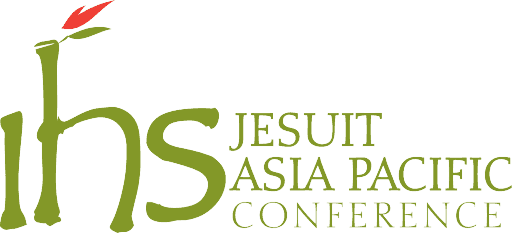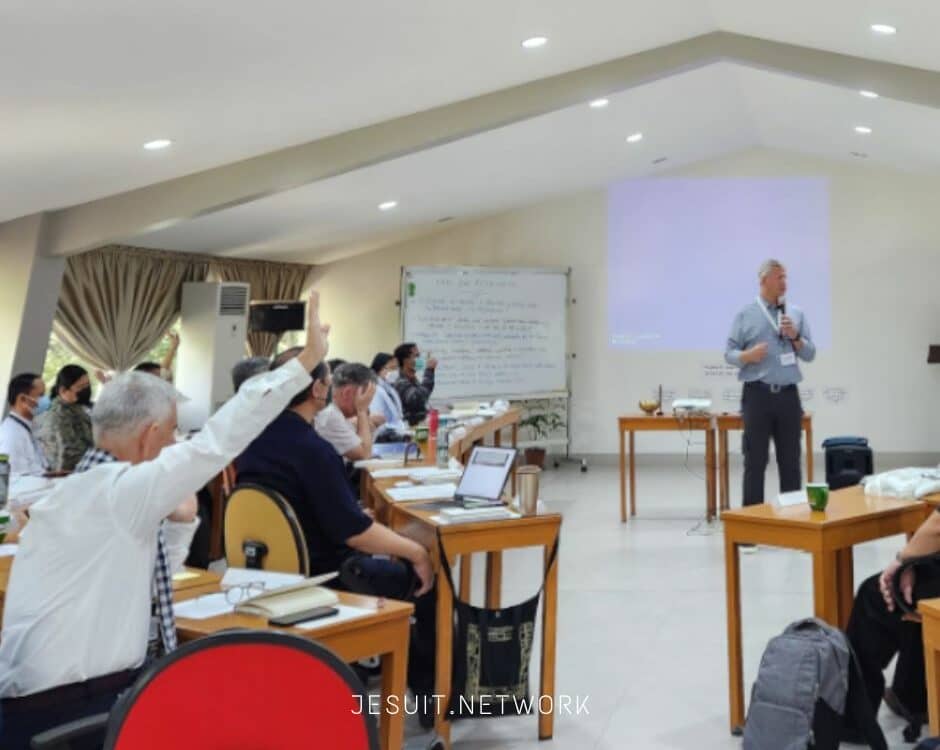This website uses cookies so that we can provide you with the best user experience possible. Cookie information is stored in your browser and performs functions such as recognising you when you return to our website and helping our team to understand which sections of the website you find most interesting and useful.
Coordination on Development Directors at Asia Pacific
“You can’t have a long face and be a development officer.” These words from Jesuit Conference of Asia Pacific (JCAP) President Fr Tony Moreno SJ certainly proved accurate for the development officers of our provinces, regions, and missions, who spent three full days in Cebu in an atmosphere of joyful learning and sharing of knowledge and best practices in fundraising for the Jesuit mission.
Their first in-person gathering in two years, the Development Officers meeting held from 21 to 23 November at the beautifully renovated Cebu Center for Ignatian Spirituality brought together Jesuits and lay partners from Indonesia, Korea, Philippines, Vietnam, Singapore, Myanmar, Timor-Leste, Thailand, Cambodia, Laos, and Taiwan, with representatives from Japan and Australia joining via Zoom.
Since many of the development officers are new in their role, the sessions focussed on the essential elements of setting up a development office, storytelling, and grant writing. Helen Forde, CEO of Jesuit Mission Australia and Coordinator of the JCAP Development Officers secretariat, facilitated the meeting and guided the participants in the steps, tools, and activities needed for building a successful office and a fundraising programme. She also highlighted the importance of donor care, and crafting good propositions that communicate the need, the urgency, and the outcome.
On hand to share about the power of telling a good story and how to convey it through a newsletter were Ria Limjap and Vanessa Gorra of JCAP communications. Good stories are those that capture the emotions of the readers, command their attention, and create empathy in them.
A big part of the meeting was devoted to a training in grant writing, which was led by Australian Marist brother, Allen Sherry fsm. Br Al has been working in fundraising and international development for several decades. Through a mix of presentations and discussion-based activities, he led the group through the project management cycle covering the basics of project proposals, finding and applying to funding agencies, reporting, and building relationships with funders.
Jesuit Mission International Programs Manager Kath Rosic gave a very important input on donor requirements for safeguarding. She asked: What does your organisation do to keep children safe? She stressed the importance of having policies for protecting children and vulnerable adults, and ensuring that the policies are being implemented. Fr Tony also shared updates on safeguarding requirements from the General Curia in Rome.
As the workshops wound down, the group began discussing the situation and challenges in Myanmar. The Philippine Province recently set up a Myanmar Desk as the mission became a dependent region of the province. Among the needs are to build a strong international community for solidary actions, and a network of support for relief and other sustainable interventions.
Fr Joe Quilongquilong SJ, President of the Philippine Jesuit Aid Association, also related the approaches that the Philippine Province has taken in response to Fr General Arturo Sosa’s request to raise funds for formation, and care for sick and elderly Jesuits.
The most valuable part of the meeting was the opportunity for the delegates to connect and ask questions from their companions and explore solutions together.
“Organising a development office is a real challenge,” shared Fr Vidal Gornez Jr SJ, JCAP Development Officer. “I feel the need for JCAP to raise funds to support our common works in the conference.”
Indeed, fundraising requires the courage to ask. “A lot of times people give simply because they were asked to,” Helen said, reminding the group of the importance of simply asking people.
Laura Choo from GIPUM NANUM (Joy of Sharing Foundation) in Korea shared that the turning point for her was hearing Helen say, “I will help you.” Helen was speaking to Fr Vinai Boonlue SJ, who is running Xavier Learning Community in Thailand. “At that moment, I realised that there was somebody who could help me, too,” said Laura. “Sometimes it’s easy to think about our own work and focus on our limitations. I am grateful to be on a journey of solidarity with my Ignatian family.”
Amid the intensive sessions, the delegates were able to step out of the meeting hall to explore the rich cultural heritage of Cebu and the close ties between the Jesuits and the Filipino-Chinese community there. In fact, the first mission given to the Jesuits when they came to Cebu in 1595 was to the Chinese community. The group visited the Jesuit house in Parian completed in 1730 and considered the oldest dated house in the Philippines, before stopping briefly at the Sugbu Chinese Heritage Museum. A visit to the island would have been incomplete without seeing Magellan’s Cross and the Minor Basilica of the Santo Niño, which houses the original statue of the Child Jesus gifted by Portuguese explorer Ferdinand Magellan to the Cebu chieftain’s wife in the 16th century. The highlight of the tour was a visit to the Jesuit-run Sacred Heart Parish, which has been declared the Archdiocesan Shrine of the Most Sacred Heart of Jesus.
At the end of the three days, it was obvious that good relationships are what matter most. This was evident at the wonderful dinners hosted by the benefactors of the Philippine Jesuits for the development officers. Palpable was the joy of giving, the spirit of collaboration, and being friends in the Lord.
Source: JCAP





